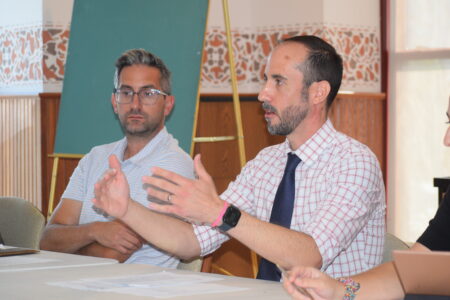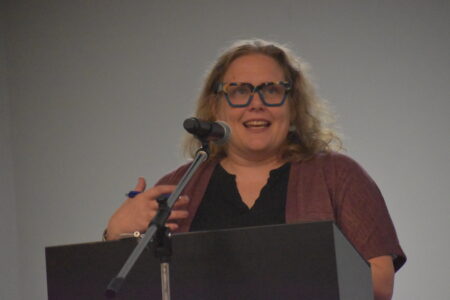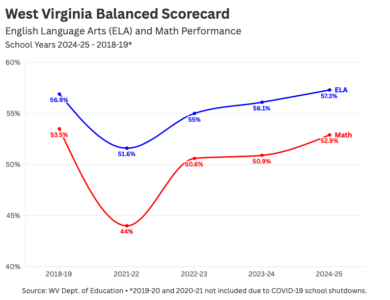Public Weighs In on Next Round of Opioid Grant Funding

photo by: Derek Redd
Northwood Health Systems Director Jeremy Sagun, right, and Catholic Charities West Virginia CEO Mark Phillips talk to the audience Monday at a West Virginia First Foundation listening session at Catholic Charities headquarters in Wheeling.
WHEELING — The West Virginia First Foundation will soon distribute $19.2 million in a new Momentum Initiative Grant to help organizations throughout the Mountain State combat substance use disorder and promote recovery.
On Monday, a regional expert panel listened to Ohio Valley residents’ questions and suggestions about the upcoming opportunity.
The groups met Monday morning at the Wheeling headquarters of Catholic Charities West Virginia. On the panel were Northwood Health Systems Director Jeremy Sagun, Susan Harrison, executive director of CASA for Children, Catholic Charities CEO Mark Phillips, Dr. Steven Corder, medical director for Northwood Health Systems, Wheeling Police Chief Shawn Schwertfeger and Ohio County EMA Director Lou Vargo.
Panel members said one of the biggest reasons for Monday’s listening session was a lack of applications for WVFF funds in the first round of distributions.
The West Virginia First Foundation oversees the disbursement of funds from settlements in the state’s opioid lawsuits against manufacturers and distributors.
“The focus, really, is trying to look at some of the areas of biggest need or the idea of where you can get the most return on your investment,” said Corder, who sits on the WVFF Board of Directors.
This round of grants will be a little different, they said. Rather than focus on a geographic model for distribution, this round will be merit-based and establish award caps up front. The grants will be distributed within five target areas:
– $3.9 million for foster care and non-parental caregivers. This will be a statewide target area. The other four will be regional in reach.
– $4 million for youth prevention: evidence-based prevention for at-risk youth, with emphasis on ages 8-13.
– $3.8 million for recovery housing: expansion of certified recovery residences through construction or purchase.
– $3.75 million for workforce development: building capacity in behavioral health professions through training and pipelines.
– $3.75 million for reentry programs: strengthening day report centers and services that reduce recidivism.
Wheeling resident Mary Reinbold told the panel she was very happy to see foster care as a priority in this round of funds. She used to work in early childhood education, and said that oftentimes, when a child is taken from biological parents, placed in a foster home and returned to their biological parents, there is an additional trauma, especially for younger children.
“This is something that is growing and we’re not going to see the effects of that trauma for years to come,” she said.
Reinbold suggested a bridge system for foster families and biological parents.
“So biological parents who are going into rehabilitation could have a chance to still be a part of the child’s life while they’re in foster care and still maintain some type of role of caretaker,” she said. “So when the child is placed back into their care full time, that bond and that trust is still growing.”
Vincent DeGeorge, a Wheeling resident who volunteers with several organizations working with those experiencing addiction, requested that, in this round of grants, the focus on funding remains with treatment, rather than distributing much of those funds to law enforcement agencies.
“Some of the opioid settlement funds (in the first round) both from West Virginia First and from municipalities, went toward law enforcement, which is good,” he said. “I want to stress that our community does support law enforcement. … We want law enforcement to keep doing their part with this.
“But with these opioid settlement funds,” he continued, “we have an opportunity to fund treatment and prevention which is otherwise not easily funded. It would call that an understatement. I want to make sure that these funds go toward honoring especially those who have lost their lives to the opioid epidemic and those who can still save their lives by targeted treatment.
Corder stressed that it is important for Northern Panhandle organizations to submit applications for grant funding. The window opens Monday, Sept. 22, and closes at noon Friday, Oct. 10.
The foundation board will review applications through Dec. 4, vote on the funding Dec. 11 and notify recipients before the end of 2025.
For more information, visit wvfirst.org/mig/.





